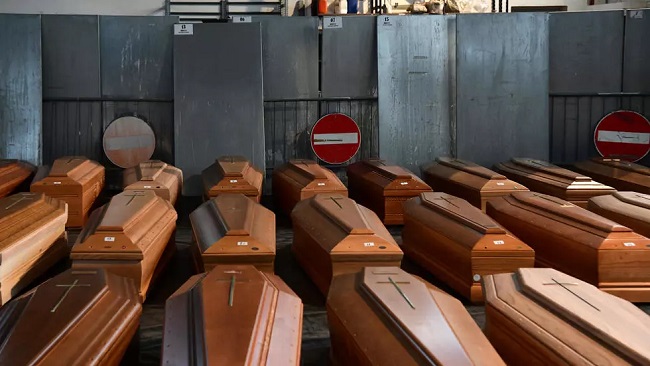Coronavirus death toll passes 900,000 worldwide
The global death toll from the coronavirus pandemic has topped 900,000 since the respiratory disease first appeared in China last year, according to an AFP tally.
As the fatalities climbed, US President Donald Trump admitted he had tried to minimise the seriousness of the Covid-19 threat at the start of the pandemic, in audio recordings released Wednesday from interviews with veteran journalist Bob Woodward.
“I wanted to always play it down,” Trump told Woodward on March 19, according to a CNN preview of the book “Rage”, due to be published this month.
“I still like playing it down, because I don’t want to create a panic,” he said in the recorded conversation with Woodward.
There have been more than 27.7 million confirmed virus cases worldwide, according to an AFP count based on official statistics, with the worst-hit region Latin America and the Caribbean, followed by Europe.
The country with the most coronavirus deaths is the United States with over 190,000 fatalities, followed by Brazil.
With billions of people around the world still suffering from the fallout of the crisis, a worldwide race for a vaccine is underway, with nine companies already in late-stage Phase 3 trials.
However clinical trials on one of the most advanced experimental Covid-19 vaccines, which is being developed by pharmaceutical company AstraZeneca and Oxford University, were “paused” this week after a volunteer developed an unexplained illness.
– Russian trials ‘too small’ –
Russia has already approved a vaccine and on Wednesday began inoculating volunteers in Moscow, the capital’s deputy mayor said.
Russia announced last month that its vaccine, named “Sputnik V” — after the Soviet-era satellite that was the first launched into space in 1957 — had received approval.
Research published in The Lancet medical journal last week said patients involved in early tests in Russia developed antibodies with “no serious adverse events”, although scientists cautioned the trials were too small.
High-profile Russians have already been vaccinated, including President Vladimir Putin’s daughter, Moscow’s mayor, and nationalist politician Vladimir Zhirinovsky.
Clinical trials of a Chinese-made vaccine in Brazil have shown “extremely positive” results, and a widespread vaccination campaign could begin as early as December, the governor of Sao Paulo state said.
AstraZeneca said it had “voluntarily paused vaccination to allow review of safety data”, adding that in large-scale trials, illnesses will sometimes happen by chance, but must be reviewed independently.
David Lo, a professor of biomedical sciences at the University of California, Riverside, told AFP the company’s decision is not necessarily a setback.
“Probably right now it’s just being cautious — it’s a pause, it’s not the same thing as saying, ‘We can’t move forward’,” said Lo.
“In some ways I’m quite relieved, it means they’re really paying attention.”
The volunteer may have experienced an adverse reaction already seen in earlier patients such as fever and soreness, but in a more severe form, Lo added.
– ‘Standard process’ –
Britain’s health minister Matt Hancock said it was not the first pause in the trials of the AstraZeneca vaccine.
“It’s a standard process in clinical trials. There was a pause earlier in the summer and that was resolved without a problem,” he told Sky News.
China, meanwhile, put its homegrown vaccines on display for the first time at a Beijing trade fair this week, and authorities hope one will be approved for use by the end of the year.
The economic impact of the virus continues to wreak havoc on economies around the world, with governments desperate to get back to normality.
South Africa announced its economy had shrunk by more than half in the second quarter, as the epidemic took its toll on Africa’s most industrialised state.
Source: AFP





